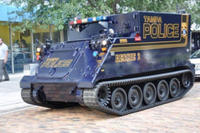-
Spike in violent incidents in hospitals

Over the past decade, hospitals across the nation have been subject to an alarming increase in violent incidents; in the last five years alone, there has been nearly a 300 percent increase in the number of reported homicides, assaults, and rapes compared to the previous five years
-
-
Police chiefs at White House to discuss domestic radicalization
Law enforcement officials from state and local agencies across the United States gathered on Wednesday at the White House to discuss the delicate balance between safeguarding against domestic extremism and maintaining the trust of the residents they serve
-
-
Tampa begins preparations for Republican National Convention

As Tampa Bay gears up for the Republican National Convention, city officials recently announced some of its security plans for the three day event scheduled to begin on 27 August; with roughly 2,000 law enforcement officers between Tampa and Hillsborough counties, a significant number of additional officers will have to be called in from surrounding counties
-
-
New smartphone apps help catch thieves

Thanks to new laptop and smartphone apps, individuals who have had their devices stolen now have a tool to help catch the thieves
-
-
Record high police fatalities, second year in a row
For the second year in a row, a record number of law enforcement officers were killed in the line of duty; the chairman of the National Law Enforcement Officers Memorial Fund blamed the recent spate of law enforcement deaths on budget cuts
-
-
Half of U.S. jails not in national vaccination campaign

A new study by the Centers for Disease Control and Prevention (CDC) found that more than half of U.S. jails are not included in the national flu vaccine campaign, despite the fact that jail and prison inmates are at increased risk of catching infectious diseases
-
-
The reasons for NYC’s dramatic crime decline
New York City saw more than 80 percent drop in crime from 1990 to 2009; a new says that changes in police tactics, rather than imprisoning more people are trying to win the war on drugs, explain why NYC has become a much safer city
-
-
Mentalix wins contract to convert Texas fingerprint archive
Mentalix Inc. was recently awarded a contract by Texas’ Department of Public Safety’s Crime Records Service to scan more than 1.4 million fingerprint cards from its oldest archive
-
-
Law enforcement fatalities rise sharply for second year in a row

For the second straight year, law enforcement fatalities in the United States rose with 173 federal, state, and local officers killed in the line of duty during 2011; this represents a 13 percent increase over the 153 officers killed in 2010 and a 42 percent spike when compared to the 122 officers who lost their lives in the line of duty in 2009
-
-
Emergency responders prepare for chaotic New Year’s Eve
Emergency responders across the nation are gearing up for another busy New Year’s; each year the holiday sends overly enthusiastic revelers to the emergency room with alcohol-fueled deaths and injuries, but this New Year’s is expected to be particularly chaotic as it falls on a Saturday, giving party-goers all day to imbibe and a full day to recover
-
-
Union Pacific not liable for drugs hidden on board trains
On Monday a federal judge ruled against U.S. border officials, stating that they overstepped their bounds in fining Union Pacific millions of dollars for failing to uncover illegal drugs hidden aboard their rail cars by smugglers
-
-
Cartels eye Puerto Rico as new cash smuggling route
Over the past year law enforcement officials in Puerto Rico have seized an increasing amount of smuggled cash, indicating that cartels may be shifting their attention to the island as an alternative route to transport drug money
-
-
Death of fourteen bomb dogs sparks $1 million lawsuit

A firm that trains bomb sniffing dogs for law enforcement and military personnel is suing a transportation company for more than $1 million over the deaths of fourteen highly-trained canines bound for Afghanistan
-
-
DHS helps New Mexico battle local gangs and cartels

In recent years, DHS has sent more and more federal agents and resources to New Mexico to help local law enforcement officials battle gangs, catch drug dealers, and other criminals; since 2009 DHS has deployed more than sixty agents to New Mexico and formed several joint task forces and multiagency groups
-
-
Rapid DNA test system nears completion
Thanks to an additional $40 million in funding, IntegenX is close to creating a real-time DNA analysis system; the company is currently working to complete a rapid DNA test kit that can provide law enforcement officials, government agencies, or forensic laboratories with real-time biometric identification
-
More headlines
The long view
How Male Grievance Fuels Radicalization and Extremist Violence
By Haily Tran
Social extremism is evolving in reach and form. While traditional racial supremacy ideologies remain, contemporary movements are now often fueled by something more personal and emotionally resonant: male grievance.
